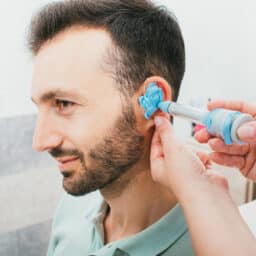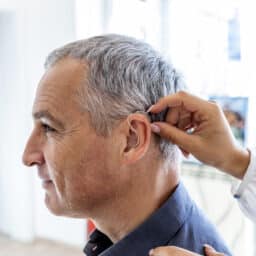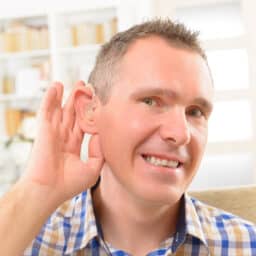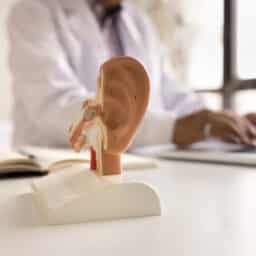How to Keep Your Hearing Aids Safe from Pets

According to the Centers for Disease Control and Prevention, “In 2019, 7.1% of adults aged 45 and over used a hearing aid.” If you’re one of these numbers or you’ve made the investment more recently, you need to know how to store your hearing aids safely so your pets can’t get ahold of them. We…
Common Misconceptions About Tinnitus
Tinnitus is the perception of ringing, buzzing or other sounds despite no sound being present. Nearly 10% of U.S. adults have experienced tinnitus lasting five minutes or more. Despite its prevalence, there are misconceptions about tinnitus and how it affects people, as well as what can be done to manage it. Here are a few…
Tips for Traveling with Tinnitus
Traveling, especially for vacation, can be fun and exciting. For those living with tinnitus, traveling even for pleasure can present unique challenges. Tinnitus is the perception of ringing, buzzing or other sounds that aren’t present and nearly 10% of the U.S. population has experienced tinnitus lasting at least five minutes in the past year. The…
Do Hearing Aids Help Tinnitus?
Tinnitus is a condition characterized by hearing sounds that aren’t caused by external sources, such as ringing, buzzing or hissing. Approximately 10% of Americans have experienced tinnitus lasting five minutes or more in the past year. Understanding how tinnitus relates to hearing loss and the role hearing aids can play in managing its symptoms can…
Are Custom Earplugs Right for You?

Whether you took a woodshop class in high school, worked in construction or attended many concerts at the Hollywood Bowl, you’re probably familiar with hearing protection options like earmuffs or earplugs. While earmuffs and earplugs offer good hearing protection, people frequently exposed to high-volume noise may want to consider custom earplugs to ensure their hearing…
Coping with Hearing Loss: Tips for Acceptance and Treatment

Nearly 20% of the global population lives with some degree of hearing loss. While common, discovering you have hearing loss can be challenging and a little unnerving. Here are some tips to help you navigate this condition with confidence and ease. Express Your Emotions Accepting your hearing loss begins with acknowledging your condition and sharing…
Tips to Create a Daily Hearing Aid Routine

Embarking on the journey of wearing hearing aids can be both exciting and challenging. While these devices open a world of sound and connection, they also require some adjustment and care to ensure they function optimally. Among adults aged 70 and older who need hearing aids, only 30% have ever used them. Establishing a routine…
Why Is It Important To Treat Hearing Loss as a Senior?

Hearing loss is one of the most common conditions affecting older adults, with approximately one in three people between 65 and 74 experiencing difficulty hearing. Hearing loss can leave you feeling disconnected from those around you. In many cases, it can lead to frustration, irritability, anxiety and depression. Despite the negative effects of living with…
Tips To Improve Hearing Aid Comfort

Approximately 28.8 million U.S. adults could benefit from the use of hearing aids. Embracing the hearing aid journey, filled with vibrant sounds and crystal-clear conversations, is an exciting adventure. However, amidst the joy, it’s natural to experience some initial discomfort as you adapt to wearing your new devices. Let’s explore some tips to ensure comfort…
What To Know About Hearing Loss Surgeries

Nearly 30 million people age 12 or older has hearing loss in the United States. When not addressed, it has the potential to negatively impact quality of life. There are varied treatment options for hearing loss, depending on its cause and in some cases, surgical intervention is necessary. Depending on the form of hearing loss,…